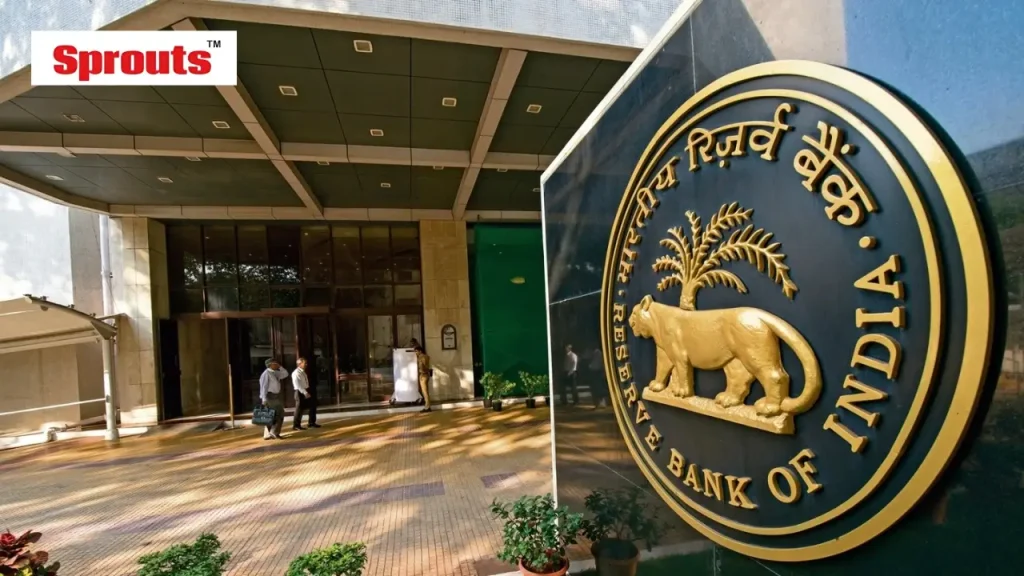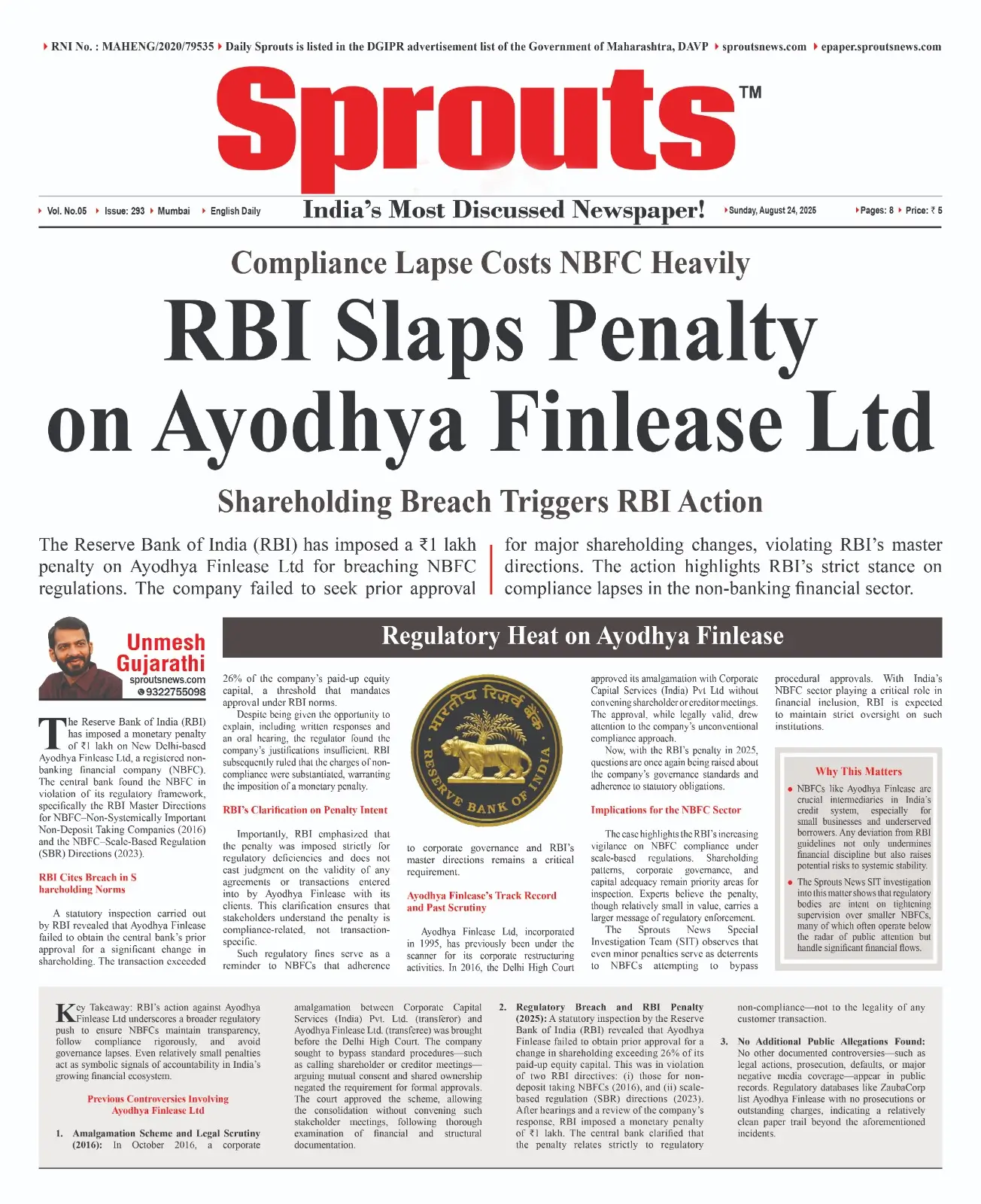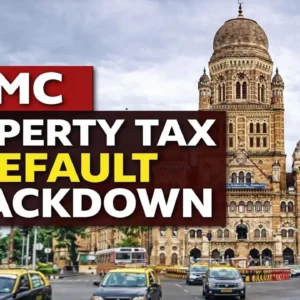RBI Slaps Penalty on Ayodhya Finlease Ltd for Regulatory Breach
• Compliance Lapse Costs NBFC Heavily
•Shareholding Breach Triggers RBI Action
•Regulatory Heat on Ayodhya Finlease
Unmesh Gujarathi
Sprouts News Exclusive
Contact: +91 9322755098
Sprouts News Exclusive
Contact: +91 9322755098
The Reserve Bank of India (RBI) has imposed a ₹1 lakh penalty on Ayodhya Finlease Ltd for breaching NBFC regulations. The company failed to seek prior approval for major shareholding changes, violating RBI’s master directions. The action highlights RBI’s strict stance on compliance lapses in the non-banking financial sector.
The Reserve Bank of India (RBI) has imposed a monetary penalty of ₹1 lakh on New Delhi-based Ayodhya Finlease Ltd, a registered non-banking financial company (NBFC). The central bank found the NBFC in violation of its regulatory framework, specifically the RBI Master Directions for NBFC–Non-Systemically Important Non-Deposit Taking Companies (2016) and the NBFC–Scale-Based Regulation (SBR) Directions (2023).
Contents
- RBI Slaps Penalty on Ayodhya Finlease Ltd for Regulatory Breach
- • Compliance Lapse Costs NBFC Heavily
- •Shareholding Breach Triggers RBI Action
- •Regulatory Heat on Ayodhya Finlease
- RBI Cites Breach in Shareholding Norms
- RBI’s Clarification on Penalty Intent
- Ayodhya Finlease’s Track Record and Past Scrutiny
- Previous Controversies Involving Ayodhya Finlease Ltd
RBI Cites Breach in Shareholding Norms
A statutory inspection carried out by RBI revealed that Ayodhya Finlease failed to obtain the central bank’s prior approval for a significant change in shareholding. The transaction exceeded 26% of the company’s paid-up equity capital, a threshold that mandates approval under RBI norms.
Despite being given the opportunity to explain, including written responses and an oral hearing, the regulator found the company’s justifications insufficient. RBI subsequently ruled that the charges of non-compliance were substantiated, warranting the imposition of a monetary penalty.
RBI’s Clarification on Penalty Intent
Importantly, RBI emphasized that the penalty was imposed strictly for regulatory deficiencies and does not cast judgment on the validity of any agreements or transactions entered into by Ayodhya Finlease with its clients. This clarification ensures that stakeholders understand the penalty is compliance-related, not transaction-specific.
Such regulatory fines serve as a reminder to NBFCs that adherence to corporate governance and RBI’s master directions remains a critical requirement.
Ayodhya Finlease’s Track Record and Past Scrutiny
Ayodhya Finlease Ltd, incorporated in 1995, has previously been under the scanner for its corporate restructuring activities. In 2016, the Delhi High Court approved its amalgamation with Corporate Capital Services (India) Pvt Ltd without convening shareholder or creditor meetings. The approval, while legally valid, drew attention to the company’s unconventional compliance approach.
Now, with the RBI’s penalty in 2025, questions are once again being raised about the company’s governance standards and adherence to statutory obligations.
Implications for the NBFC Sector
The case highlights the RBI’s increasing vigilance on NBFC compliance under scale-based regulations. Shareholding patterns, corporate governance, and capital adequacy remain priority areas for inspection. Experts believe the penalty, though relatively small in value, carries a larger message of regulatory enforcement.
The Sprouts News Special Investigation Team (SIT) observes that even minor penalties serve as deterrents to NBFCs attempting to bypass procedural approvals. With India’s NBFC sector playing a critical role in financial inclusion, RBI is expected to maintain strict oversight on such institutions.
Why This Matters
NBFCs like Ayodhya Finlease are crucial intermediaries in India’s credit system, especially for small businesses and underserved borrowers. Any deviation from RBI guidelines not only undermines financial discipline but also raises potential risks to systemic stability.
The Sprouts News SIT investigation into this matter shows that regulatory bodies are intent on tightening supervision over smaller NBFCs, many of which often operate below the radar of public attention but handle significant financial flows.
Key Takeaway: RBI’s action against Ayodhya Finlease Ltd underscores a broader regulatory push to ensure NBFCs maintain transparency, follow compliance rigorously, and avoid governance lapses. Even relatively small penalties act as symbolic signals of accountability in India’s growing financial ecosystem.
Previous Controversies Involving Ayodhya Finlease Ltd
1. Amalgamation Scheme and Legal Scrutiny (2016)
In October 2016, a corporate amalgamation between Corporate Capital Services (India) Pvt. Ltd. (transferor) and Ayodhya Finlease Ltd. (transferee) was brought before the Delhi High Court. The company sought to bypass standard procedures—such as calling shareholder or creditor meetings—arguing mutual consent and shared ownership negated the requirement for formal approvals. The court approved the scheme, allowing the consolidation without convening such stakeholder meetings, following thorough examination of financial and structural documentation.
2. Regulatory Breach and RBI Penalty (2025)
A statutory inspection by the Reserve Bank of India (RBI) revealed that Ayodhya Finlease failed to obtain prior approval for a change in shareholding exceeding 26% of its paid-up equity capital. This was in violation of two RBI directives: (i) those for non-deposit taking NBFCs (2016), and (ii) scale-based regulation (SBR) directions (2023). After hearings and a review of the company’s response, RBI imposed a monetary penalty of ₹1 lakh. The central bank clarified that the penalty relates strictly to regulatory non-compliance—not to the legality of any customer transaction.
3. No Additional Public Allegations Found
No other documented controversies—such as legal actions, prosecution, defaults, or major negative media coverage—appear in public records. Regulatory databases like ZaubaCorp list Ayodhya Finlease with no prosecutions or outstanding charges, indicating a relatively clean paper trail beyond the aforementioned incidents.



















